As the British film industry continues to struggle in the face of fickle financing and political adversity there are but a handful of dedicated genre fans still flying the flag for British horror, one of them being passionate horror fan/film producer Jonathan Sothcott who takes some time out to chat with Stu Willis about his career and incoming productions�
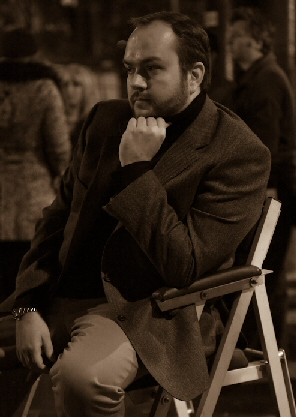
Stu: Hi Jonathan. Firstly, thanks a lot for agreeing to this interview. It's great to get the opportunity to talk with you.
Jonathan: Thank you very much I have read SGM for years it is a great site and has terrific content.
Stu: First things first. Let's talk about your pre-Black And Blue days. I believe your career began as an entertainment journalist. Was this the vocation you studied towards?
Jonathan: Not at all, only in so much as I was good at English at school. I never went to University. When I was in my mid-teens I started writing for The DarkSide magazine. The magazine has had a lot of stick over the years but it was, as far as I'm concerned, the only horror mag of any note in this country since House of Hammer in the 70s. I was VERY lucky that Allan Bryce liked my stuff and gave me a break. The problem was that although I could write a bit, I didn't really understand how films were made. This began to be solved when I was interviewed for the 'making of' documentary on The Wicker Man DVD release (I'm still not quite sure how I blagged that gig) - that was the game-changer. Two very smart lads called David Gregory and Carl Daft who were boutique distributors here had teamed up with film-maker Bill Lustig and were making a vast amount of special features for DVD releases of library titles for an American distributor called Anchor Bay. By this point I had contributed heavily to a book called Ten Years of Terror, about Brit horror films of the 70s and so David and Carl gave me a real break - they hired me to interview actors and film-makers for the audio commentaries on these movies. Between 2000 and 2004 I did about 50 of these, everything from a bunch of Hammer Horrors to the Cliff Richard film Summer Holiday and I got to work with bona fide movie legends like Freddie Francis, Roger Moore, Bryan Forbes, Brian Clemens and Susannah York. Fun times.
Stu: What was it that led you to progress from journalism to running the Horror Channel?
Jonathan: Blagging. I read about the Horror Channel launching and called up the guy who owned it. He was a tech ops guy who had an understanding of channel management to a degree but not of the genre - but he'd had a bloody good idea. I had a couple of meetings with them and they offered me the gig� and I thought about it for all of half a second before saying yes!
Stu: You might be able to answer this actually: how come some of the films shown by The Horror Channel (SPIDER BABY, BLOODSUCKING FREAKS, NIGHT OF THE DEMON [81]) are yet to receive good uncut UK DVD releases?
Jonathan: I guess because nobody has licensed them for DVD, though they were acquired after my time so I can't say for sure.
Stu: The Horror Channel was a landmark event for British television viewers. But as much as it was appreciated, there were also those who berated the schedules. How did you cope with the restrictions of budget and classification?
Jonathan: The budget was the problem. I took the job on the understanding my acquisitions budget would be in the low six figures. It turned out to be �20,000 for the first 6 months because they were massively underfunded and were relying on the woolly idea people would 'do favours' in the hope it became a huge success and they'd share in the 'glory'. Perhaps unsurprisingly nobody bought into that. I had amazing deals lined up with Fox and MGM in particular (the MGM catalogue is genre gold) but when a load of zeros came off my budget, there wasn't much I could do beyond screening Nosferatu and Night of the Living Dead 19,000 times a day! Also, at the time, being in a movie slot on Sky meant I was restricted in buying TV drama so there were a LOT of film repeats. I was pleased I squeezed a deal with Carlton through to get a few forgotten gems like Nothing But The Night on, but believe me when I tell you that nobody was more disappointed with it all than me! So after 6 months, with no more budget and the prospect of screening Sacred Flesh and White Zombie every day for the next 6 months I thought "fuck this, I'm off" and resigned.
Stu: In some respects, the confines of programming for The Horror Channel - considering tight budgets, audience demographics etc - must've helped develop your skills as a producer?
Jonathan: It gave me an understanding of TV acquisitions which is a key part of ancillary sales. It introduced me to and educated me about sales agents and distributors but there wasn't as much skill in it as considering audience demographics - the only thing that mattered at THC was the product being cheap (or preferably free!!).
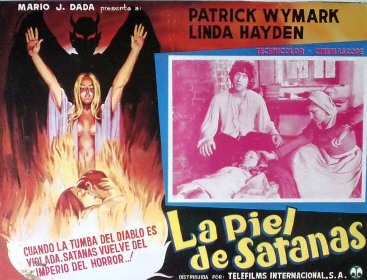
Stu: Your career as a producer began around a decade ago with documentary featurettes, focusing on some notable figures such as Judy Gleeson (INSEMINOID) and Linda Hayden (BLOOD ON SATAN'S CLAW). Could you tell us a little about these experiences - your physical involvement in them, the learning curve that provided, how they helped forge your later career through establishing contacts etc?
Jonathan: This was an extension of what I was doing with Carl and David. I only did a couple - they were off in the US by then doing bigger and better things so I figured I'd have a go and make a pound note. It varied from featurette to featurette - the Geeson one we subcontracted a guy in the US to interview her. The Hayden one (and particularly the 'Blood On Satan's Claw' one) I was very involved - coming up with the idea, pitching it (with my pal Simon Sprackling), booking the talent, conducting the interviews and delivering the finished product.
Stu: You moved into feature production in 2006 with WISHBABY. This was an unusual film, a genuinely different (for its time) blend of urban reality and authentic scares. I imagine it was difficult to pitch though?
Jonathan: It wasn't a pitch. Steve Parsons, a top soundtrack composer, had basically self-financed it in order to launch a directorial career. He needed some finishing money and I came on once it was at rough cut stage to help with that. Unfortunately we got tangled up with some highly suspect characters and though (a) the film was very good and (b) I got us a UK deal, it has sunk without trace. I think it was ahead of its time and maybe a bit too arty, but I'm very proud to have been involved.
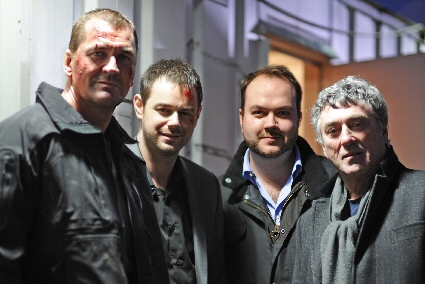
Stu: How did you come to meet Billy Murray and Martin Kemp?
Jonathan: I had the rights to remake House On Straw Hill as far back as 2005 and wanted Martin Kemp as the leading man - he has proper leading man charisma. We met, got on well and when it went tits up and the financiers never came up with the money, Martin was very supportive of me and said why don't we go and try and start a film company. So we made a short film that he directed and sort of went from there. Billy we met not long after, when he was promoting Rise of the Footsoldier, which he produced and was in. Bill and I got on like a house on fire, he is my best friend, and in early 2009 we asked him to join the board. He has genuine respect as one of the few credible Exec Producers in the country. He's also a bloody good actor and I love having him in the movies.
Stu: So, Black And Blue. The production company co-ran by yourself, Martin, Billy and Steve Matthews. If there were a manifesto for the company, what would it be?
Jonathan: We make high-concept, low-budget genre films aimed at the DVD market. Generally they do what they say on the tin.
Stu: I've noted that you've already attracted a good selection of renowned British actors to your films: Colin Salmon, Danny Dyer, Jane March, Steven Berkoff, Craig Fairbrass, Rik Mayall etc. It's an impressive line-up. Do you find Martin and Billy's profile help in this respect?
Jonathan: Bill introduced me to Danny and Craig who subsequently became my pals. We have been very lucky to work with a bunch of the top actors in the country - as well as the ones you mention there's Sean Pertwee, Phil Davis, Craig Conway, MyAnna Buring, Dexter Fletcher, Richard E Grant and many more. They have fun on our movies and word spreads when we're making stuff.
Stu: Any chance of your pal Abi Titmuss popping up in a Black And Blue production?
Jonathan: Never say never! She's one of my oldest closest friends and is now making a living as an actress with great reviews so it would be nice to find something to do with her.
Stu: Are there any Brit actors you've tried to bag but haven't managed to yet? Who would be the ultimate Black And Blue coup?
Jonathan: Michael Caine, David Tennant, Ray Winstone, John Simm, Marc Warren and Tom Hardy would be great coups for us. Hoskins, Gambon, those kind of guys would be great. And I'd love to produce a Hugh Grant movie! Not British but I almost had Dirk Benedict in Just For The Record but he backed out at the last minute. I'm guessing that was concurrent with him reading the script!
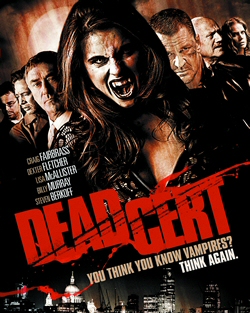
Stu: I was bowled over by your enthusiasm and all-round graciousness in the extras for DEAD CERT. Are you really that amiable - aren't producers supposed to be forever locking horns with their directors, saying "you CAN'T do that!" and so on?
Jonathan: Haha thank you! I can be tough, of course I can, and if a director's a deluded fucking idiot (and trust me I've had a few who are) I will tell him. But when you're working with nice directors like Martin Kemp or Dominic Burns who's doing a comedy called How To Stop Being A Loser for us at the minute, it is always a pleasure. I have to remind myself that I am very lucky to be making films - it is hard, sometimes maddeningly so, but it is also a great privilege and a LOT of fun.
Stu: What does your job actually entail? I mean, literally, physically?
Jonathan: Because we're small, more than I'd like� basically everything in fact! I identify the projects we are going to take on, or come up with a concept and then find a writer. I don't work particularly closely with the writers, that's down to Steve Matthews, who is brilliant at that stuff. Once we have a script, then I find a director and the key cast, do a UK distribution deal and go out and raise the money. Once we're filming I swan around the set in a long coat trying to look important about once a week. Once the film is in the can I have to deliver it to the distributor. In cases like Dead Cert, which despite a great idea and a very strong cast, was abysmally directed and literally saved in post, I had to work very hard with Momentum (who were fantastic) and their PR company on the UK campaign. I work very closely with the key distributors and with our international sales agents to forecast how the market is changing and how to adapt our product to suit it. I prefer to work from home because it is quieter and I have a LOT of meetings - I really wish I could be cloned for them!
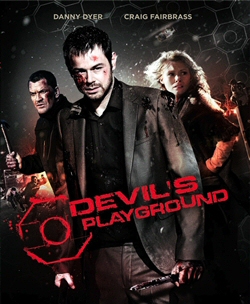
Stu: I know you have a particular affection for DEVIL'S PLAYGROUND. Would you like to tell readers more about this film, and why they need to see it?
Jonathan: Well it's a proper film with a great cast on top form, particularly Fairbrass, Conway and Dyer. The script ain't perfect, it is too generic and to be honest there's some weak casting but of all my movies I think it probably stands up the best and I think it is a genuinely enjoyable watch.
Stu: And ... Danny Dyer. A bit of a 'Marmite' character at the best of times. But ... a thoroughly nice chap? Any words you can offer to persuade the sceptical?
Jonathan: Dyer I have known for years and love him to bits. We have done 4 movies together and a load of other stuff and he is an absolute gentleman - he has a heart of gold and would do anything for you. He's also a seasoned and highly skilled screen actor and a bona fide crowd pleaser (there are VERY few). He has real star quality. It is not his fault he has to accept the odd dog of a role - he has a mortgage to pay like everyone else and actor salaries in indie films are very, very low. In the past he has said the odd silly thing that has been blown out of all proportion (I was on the BBC defending him about that ludicrous Zoo magazine scandal - it was laughable that was even deemed news) and all the negativity is boring. But cream always rises and he will become a better and better actor, a bigger and bigger movie star and, I'm sure, prove his detractors wrong.
Stu: I need to ask you about JUST FOR THE RECORD. This film has a phenomenal cast for a reported �150,000.00 budget. How on earth did you pull that off?
Jonathan: Well everyone likes films about the film industry and there wasn't much work going, I guess!! A lot of them were pals of mine too - obviously Craig, Billy and Danny but also Berkoff, Victoria Silvestedt, Lisa McAllister etc - so it was easier than you'd think.
Stu: The film has received rather scathing reviews. How do you respond to that negativity?
Jonathan: I thought they were generous - its an absolute abomination. Incoherent, uneven and in some places incompetent. It was a LOT of fun to make but we all got carried away with it and the result just isn't funny� which isn't ideal for a comedy!
Stu: Now, the film that many will be itching to learn more about is Black And Blue's remake of EXPOSE. Tell us more! Like, why choose this title to rehash? And, why re-title it STALKER?
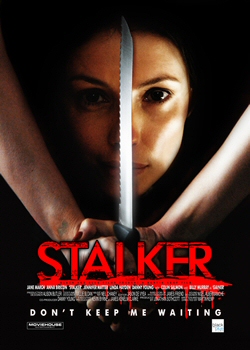
Jonathan: I had the rights already so there weren't big option costs. The title change is simply because nobody really knows the original and test audiences haven't responded well to the title because it doesn't really mean anything. It is a very good movie though.
Stu: Did you at any time approach the likes of original co-stars Udo Kier or Linda Hayden to appear in cameo roles? If so, I can imagine Hayden's reaction would've been amusing - given her low opinion of the film in the 2004 documentary you produced for Anchor Bay, "An Angel For Satan".
Jonathan: Haha funnily enough Linda has a cameo in it as the housekeeper and has a very gruesome death! She loved doing it and we loved having her on it. Our film is so far removed from the original that it didn't bother her. She's a good friend and a lovely lady.
Stu: I note that you also have titles such as THE ASPHYX and THE SORCERERS in development. Both remakes?
Jonathan: Yeah and Blood On Satan's Claw. I was at Icon yesterday and they were really excited about these. The Asphyx will shoot Q1 next year and I have my absolute favourite leading lady Alison Doody in it which is going to be brilliant - she's wonderful and a real coup.
Stu: How do you feel your company fits in to the British film industry at present? And where will Black And Blue be in 5 years' time?
Jonathan: I think there are three genuinely active producers in the low budget end of the Brit Indie pond - myself, Simon Phillips and Terry Stone. We have more of a genre profile and are associated with strongly cast horror. We were never going to get Film Council grants, and never applied for them - we are genuinely independent. We have produced 7 feature films since April 2009. In 5 years time I'd like to be making 6 genre films a year all of which wash their faces in the UK but have more international appeal than what we've been doing in the last 18 months or so.
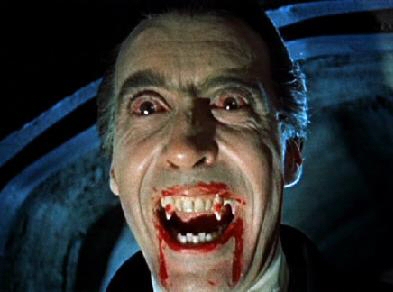
Stu: You're clearly a great lover of horror films, and in particular the great British Horror Film. Which are your favourites?
Jonathan: British ones? The Hammer Draculas, The Wicker Man, Dog Soldiers, Horror Express, Blood On Satan's Claw, Witchfinder General, Quatermass and the Pit, Company of Wolves, From Beyond The Grave, Curse of the Crimson Altar, Frankenstein Must Be Destroyed, American Werewolf in London, Carry On Screaming, To The Devil A Daughter, The Creeping Flesh, Masque of the Red Death� I could go on� more recently I was really impressed by 13 Hours, Monsters and Beyond The Rave (it was fun). On the international stuff� I could go on all day but I like 80s American stuff, particularly the fun ones like Fright Night and The Lost Boys.
Stu: Any aspirations to move into directing feature films?
Jonathan: No - it is important to know your limitations. My pet hate is new producers who take lead roles in their own films. They are invariably dreadful and can't get work the proper way. So it'd be a bit like that if I was directing.
Stu: The UK horror scene has blossomed over the last decade or so. Where do you feel it goes from here?
Jonathan: Lower budget, more international, more creature films (I really have to recommend 13 Hours Again), less 3-people-in-a-haunted-cabin. More urban stuff. I'd like to see a new Brit Dracula movie. In fact, I'd like to make it!
Stu: Thanks for your time, Jonathan. All the best with STALKER, Black And Blue and flying the flag for UK horror in general. Cheers!
Jonathan: Thank you very much.
Special thanks to Jonathan Sothcott and Black and Blue Films